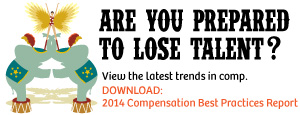PayScale’s 2014 Compensation Best Practices Report noted that 50% of companies are having a difficult time filling skilled positions.
The finding was not too surprising given all we’ve heard about the skills gap in the last few years. However, the difficulty in finding suitable employees can’t be attributed solely to job seekers and their qualifications, or lack thereof. I’ve spoken with enough hiring managers to know that many are woefully under-skilled when it comes to interviewing—not that it’s all their fault. The interviewing process is not immune to myths, and some of these can get in the way of a company recognizing talent, even when it’s staring the company in the face.
Here are five common ones.
Myth #1: Interviewing is Intuitive
It can’t be that difficult to interview someone, right? Interviewing is just talking.
Hah! Interviewing involves much more than talking (for starters, good listening skills and a robust dollop of emotional intelligence) and an interview should never be entered into unprepared. Believing that you can initiate an interview without, at a minimum, reviewing the candidate’s credentials against the job description and composing a list of preliminary questions is a sure way to a meeting that lacks focus and leaves you with more questions than answers. And while a good interview should resemble easy-going conversation, it really isn’t.
Myth #2: The More the Merrier
Whether it’s the dreaded panel interview, a group interview, or a series of interviews with “key” personnel one after the other, it’s totally possible to overdo a good thing.
Presumably, companies choose to gang up like this on some poor job-seeking soul out of the mistaken belief that more opinions will yield a better decision, but that’s not necessarily so. First, see above. A truckload of opinions from a bunch of unskilled interviewers doesn’t aid the process. Second, too many people in the interview room is a bit like too many cooks in the kitchen. At some point, everyone’s going to start tripping over each other’s feet. So while it’s fine to provide an opportunity for staff to interact with the new employee before the big day, the opportunity should be viewed as a courtesy, not a chance to revisit a decision that’s already been made by those whose job it is to make it.
Myth #3: Reference Checking Is a Waste of Time
The idea that past employers are so scared of being sued that no one will reveal more than hire dates and previous job title has become so commonplace, some hiring managers won’t even attempt a reference check. Well, that’s a mistake. At the very least, a hiring manager should confirm the basics of the last position (or two). Believe it or not, some candidates would lie about that! And if they do, what else might they be fudging? Also, regardless of how tight lipped a past employer might be, that’s no excuse to forgo seeking and securing the names and contact information of other professionals who have something to say about your candidate.
Myth #4: Having Done a Thing Makes One Qualified to Do a Thing
Now this belief makes a lot of sense, but it proves the point that an effective interview is about digging deeper. Just because your candidate has ten years of managerial experience doesn’t mean she’s a good manager—oh Heaven’s no! She could be a lousy manager. They’re hired and promoted every day. A previous job title can never tell you how well someone fulfilled her job duties.
Myth #5: NOT Having Done a Thing Makes One UN-Qualified to Do a Thing
Not true. Cliche or no, there’s a first time for everything. And I hear you, employer, saying, “Well, I don’t have time to take a chance on someone who may or may not be able to learn a new skill. I need someone who can do the job now,” but understand that this line of reasoning only goes so far. As business changes, you’re absolutely going to need someone with the potential to learn a new skill—several new skills in fact. That’s why hiring for traits and not merely a past laundry list of accomplishments can be a sound strategy.
And now for a bonus …
Myth #6: When I Meet the “Right” Candidate I’ll Know It
Oh man … see Myth #1, please. Chemistry is important, but chemistry is mutable, too. (That’s one reason 41% of first marriages end in divorce.)
Hiring for keeps is hard, no question. Don’t make it harder by buying into the above myths.


Leave a Reply